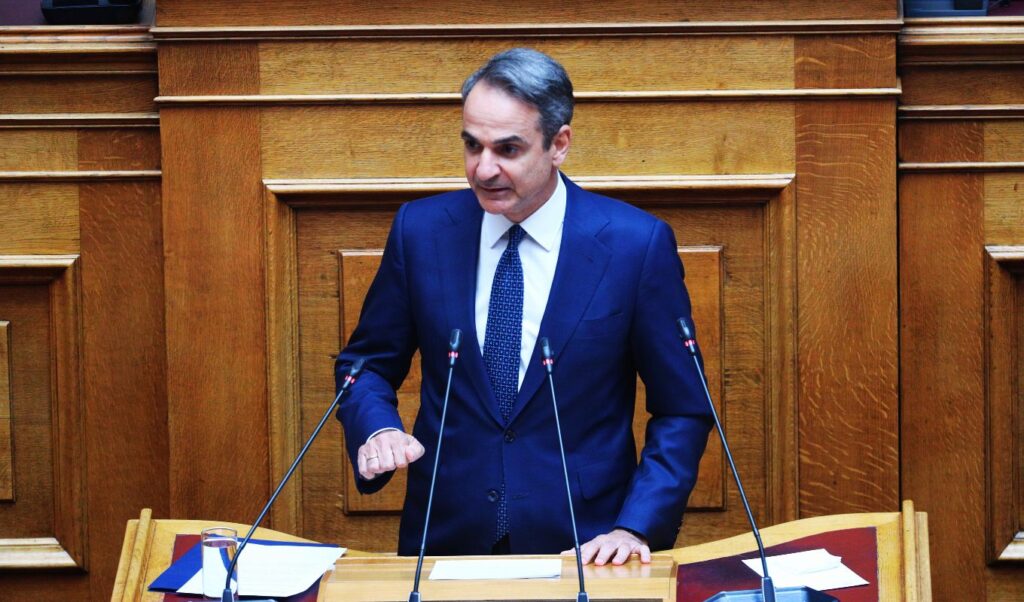Armed with Greece’s invitation and participation in major international “tables,” such as the one in Sharm el-Sheikh, Egypt for Middle East peace, Kyriakos Mitsotakis is preparing tomorrow, Thursday, to counter opposition accusations and present his vision for the country’s foreign policy. From 11 AM Thursday, an intense discussion at the political leadership level is expected to begin, following a request by Mr. Mitsotakis under Article 142A of Parliament’s Rules of Procedure, which allows the Prime Minister to inform the national representation on important issues. The discussion will focus on foreign policy, but will certainly extend to other topics, such as protecting the area in front of the Tomb of the Unknown Soldier at Syntagma Square, an issue that the Prime Minister himself has raised prominently.
The discussion takes place 48 hours after Mr. Mitsotakis’ return from Egypt, and just days before he departs for Slovenia, where on Monday, October 20, the Summit of Heads of State and Government of Mediterranean EU member states MED9 will take place in Portorož.
Kyriakos Mitsotakis’ messages: The goal of an “active role” in Gaza and the Middle East
The Prime Minister will focus particularly on developments in the Middle East and our country’s role, as it was “one of the few European countries invited to attend the signing of this important agreement,” as he emphasized in his meeting with the President of the Republic, Konstantinos Tassoulas. Regarding the next phase after the agreement’s implementation begins, Mr. Mitsotakis believes that “we have to play another very substantial role as a country that communicates with all important players in the Middle East, which has credibility, which is a pillar of stability in the Eastern Mediterranean.”
The 3 axes of Greece’s participation in Donald Trump’s peace plan
“Greece aspires to play an active role in the next day in Gaza and the Middle East and we are ready to contribute substantially to the implementation of the Peace Plan, always based on International Law and the decisions of the UN Security Council,” Foreign Minister Giorgos Gerapetritis stated yesterday after meeting with Palestinian Foreign and Diaspora Minister Varsen Aghabekyan Shahin. There he outlined for the first time the three axes of Greek involvement in implementing Donald Trump’s peace plan.
First, through massive provision of humanitarian aid for the relief of the civilian population in the Gaza Strip, in cooperation with European partners and other country allies.
Second, through continuous presence in relevant forums and dialogue with all sides. “Gaza’s stabilization is key to establishing security conditions and ensuring the fastest possible return of the Palestinian Authority to Gaza. Our country, a partner and friend with all states in the region, is a consistent and honest interlocutor. Our contribution will be critical and significant,” Mr. Gerapetritis noted characteristically.
Third, through the participation of Greek construction and technical companies in the massive undertaking of rebuilding the Gaza Strip, which has suffered very significant damage and destruction after two years of Israeli bombing and attacks by the country’s armed forces.
References to foreign policy issues are considered certain to be made tonight by Kostas Karamanlis in his speech at the National Historical Museum-Old Parliament Building, at the award ceremony for Academic Anna Psarouda-Benaki, who became the first female Parliament President during his tenure. Mr. Mitsotakis is not planning to attend today’s event, nor to respond directly tomorrow in Parliament’s Plenary to whatever the former Prime Minister will highlight.
In his speech, Mr. Mitsotakis will analyze our country’s principled stance on the two wars in Ukraine and the Middle East, will explain that he desires open communication channels with Turkey, but as long as Ankara continues to have the casus belli issue on the table and as long as it disputes the sovereignty of Greek islands through the “gray zones” theory, the government will not consent to Turkey’s inclusion in the EU’s SAFE program. He will also refer to broader geopolitical developments and will attempt to highlight again the need for political stability in the country within this turbulent international environment.




